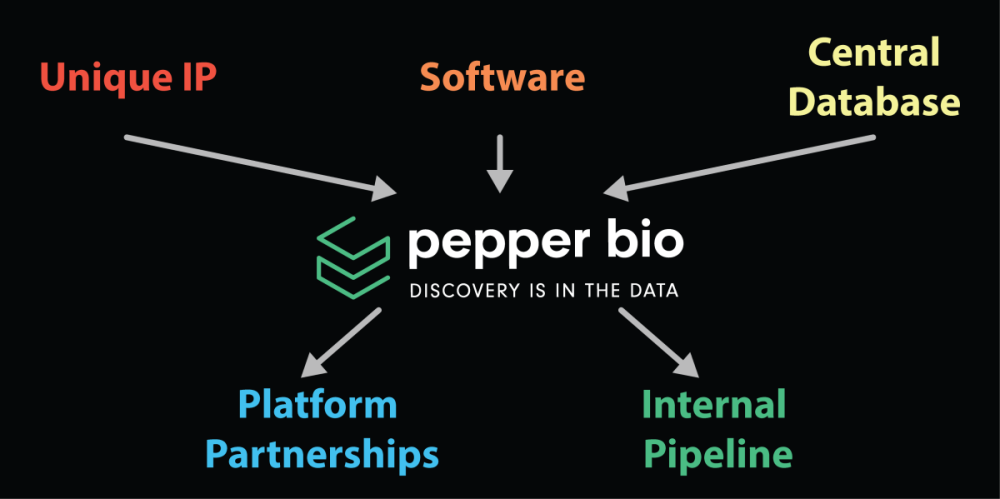By Jon Hu, CEO and Cofounder of Pepper Bio
In the last decade, the tech industry has coined the phrase “software is eating the world.” In this decade, it’s going to be biotech that eats the world.
Biotechnology, specifically, bioplatforms, are one of the main innovations changing our generation. Exhibit A: Moderna’s mRNA technology platform, which created the COVID-19 vaccine at an unprecedented rate, has changed how we perceive and interact with public health and our own individual health. And that’s only the beginning. Moderna’s platform functions as an operating system on a computer, and their “program” or “app” is the mRNA sequence that codes for a protein. There’s no doubt mRNA will continue to be used to create many more vaccines and therapeutics for years to come, but that’s just one application. To treat some of the world’s most common and deadly diseases, we need a platform that has insight across the whole biological system.
That’s why Pepper Bio is going to be the next big bioplatform that changes the course of drug development, and here’s how we’ll do it.
Our Bioplatform Business Model
First, a bioplatform is the foundation on which many biological applications—therapeutics and diagnostics—can be built.
NFX, one of our first investors, notes three defining qualities of a successful bioplatform:
- Unique IP
- Software
- Central Database
The IP allows the company to build its own products, provides value to a wide array of markets, and ensures competitive advantage. The Software — whether it’s AI, machine learning, or computer vision — is what allows the company to organize and draw insight from biological datasets, which can then be licensed to partners to build their own products. The more partners that use the software, the more biological data funnels into Central Database, which ultimately improves the company’s own core product features. At the same time, since partners also have more information to draw from, they can develop their own products faster and decrease the cost of development, so it’s a win, win. Some of the Fortune 100 pharmaceutical companies including Roche, Bayer, BMS, Sanofi have already benefited from partnerships with these bioplatforms that fit this description.
One of NFX’s first investments in this space, Mammoth Biosciences, now has a billion-dollar valuation — a testament to the potential of bioplatforms. Pepper Bio’s platform looks different, but checks each of the three success principles:
- Our IP is based on our unique, proprietary transomic data translation technology. We collect global, comprehensive data from the entire biological system, which includes DNA, RNA, protein, and protein phosphorylation.
- Our AI software analyzes each of these systems and determines functional characteristics of intercellular biologic activity. With these insights, we can not only develop our own pipeline of therapeutics but also license and sell these insights to drug developers for their own therapeutic development, maximizing our future patient impact.
- All this data has curated what is now the world’s largest proprietary transomics database. The more data we curate from our pharmaceutical and academic partners, the better of an understanding we’ll have of different diseases and can quickly determine the drug targets that do and don’t work for these diseases — in effect, accelerating clinical trials and bringing down the overall cost of drug development.
Pepper Bio’s Technical Advantage
While a number of other companies have cropped up in the drug discovery space, what makes our platform so important is that we’re the only ones with phosphoproteomic data. This specific biological data gives researchers comprehensive insight into what happens in cells before and during disease and allows them to make more informed causal inferences. Phosphoproteomics is critical for the discovery of new drug targets that treat diseases at their root cause, have less toxicity, and have higher response rates with patients exhibiting fewer, less severe side-effects.
However, not only do we identify the targets for the beginning of the clinical trial, but we also stay with our partners throughout the entire process — from lead prioritization to patient selection, to finding the right drug combinations, and to indication expansion. Plus, our platform is disease agnostic, so we’re not limited to finding only one lucky target or indication for a single drug. With the amount of biological data we’ve collected, we can identify a prolific number of targets for a variety of diseases and potentially for future, unknown diseases. Effectively, we can help our partners develop therapies for however many diseases they are focused on, while also developing our own internal drug development pipeline. Working in tandem, we can overall accelerate and increase the number of effective drugs that come to market.
As someone who has seen loved ones suffer from diseases that still have no cure, like Alzheimer’s, I am determined to implement this technology as far and wide as it will go. As the platform continues to expand, so will our ability to understand diseases and drugs.
We have an ambitious mission to find cures for currently untreatable diseases and we have the technology and strategy to make it happen. If you’re interested in joining or investing in us, please reach out to me directly at jonhu@pepper.bio.


